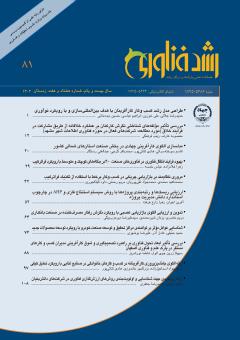مدلسازی الگوی کارآفرینی جهادی در بخش صنعت استانهای شمالی کشور
محورهای موضوعی : كارآفريني و مديريت شركتهاي دانش بنيانقاسم سوخته سرائی 1 , هادی ثنائی پور 2 * , محمدباقر گرجی 3 , عبدالغنی رستگار 4
1 - گروه کارآفرینی، واحد علی آبادکتول، دانشگاه آزاداسلامی، علی آبادکتول، ایران،
2 - دانشگاه گنبد کاووس
3 - علی اباد کتول
4 - دانشگاه گنبد کاووس
کلید واژه: روحیه کارآفرینی, گرایش کارآفرینانه, کارآفرینی جهادی, خلق ارزش, فرهنگ کارآفرینی ,
چکیده مقاله :
هدف از پژوهش حاضر ارائه الگوی کارآفرینی جهادی در استان های شمالی کشور(بخش صنعت) می باشد. این پژوهش از نوع آمیخته اکتشافی است که در بخش کیفی از روش داده بنیاد و در بخش کمّی، از روش مدل یابی معادلات ساختاری استفاده شده است. در مرحله اوّل با بهرهگیری از مبانی نظری، پیشینه تحقیق و مصاحبه با خبرگان منتخب، ابعاد و مؤلفه هاى کارآفرینی جهادی با استفاده از روش داده بنیاد با بهرهمندی از رویکرد ظاهر شونده (گلیزری) استخراج شده و طی فرآیند کدگذاری، نهایتاً 39 مؤلفه براساس دیدگاه خبرگان به عنوان ابعاد نهایی کارآفرینی جهادی تعیین شدند. خبرگان این پژوهش، 20 نفر ازصاحبنظران در حوزۀ کارآفرینی بودند که تجربه پژوهش و فعالیت دراین زمینه داشتهاند. جامعه آماری هم 225 نفر از کارآفرینانی که دردسترس و درصنایع استان های شمالی کشور در حال فعالیت می باشند انتخاب شده اند. در مرحله کمّی نیز از روش مصاحبه نیمه ساختار یافته به منظور دستیابی به نظر متخصصین و استفاده از نظریات ایشان در جهت تقویت هرچه بیشتر پژوهش، استفاده شده است. نتایج نشان داد اخلاص و روحیه کارآفرینی جهادی، زیربناییترین بُعد مدل است و بیشترین تأثیر را در ظرفیت سازی در این زمینه دارد. همچنین مؤلفه های مخاطره جویی و توفیق طلبی، نگرش کارآفرینی جهادی، آرمان گرایی، فرهنگ کار جهادی، توانایی کارآفرینی جهادی، کنشگری آگاهانه، انگیزههای کارآفرینی جهادی و کارآفرینی اجتماعی از دیگر ابعاد این مدل بوده و نتیجه نهایی این فرآیند، خلق ارزش کارآفرینی جهادی میباشد.
The purpose of the present research is to present the model of jihadi entrepreneurship in the northern provinces of the country (industry sector). This research is of mixed exploratory type, in the qualitative part of the foundation data method and in the quantitative part, the structural equation modeling method was used. In the first stage, by using the theoretical foundations, research background and interviews with selected experts, the dimensions and components of Jihadi entrepreneurship were extracted using the Foundation's data method with the benefit of the emergent (glazier) approach, and during the coding process, finally 39 components based on the point of view were extracted. Experts were determined as the ultimate dimensions of jihadi entrepreneurship. The experts of this research were 20 experts in the field of entrepreneurship who had research and activity experience in this field. The statistical population is 225 entrepreneurs who are active in the industries of the northern provinces of the country. In the quantitative stage, the semi-structured interview method has been used in order to obtain the opinions of experts and use their opinions in order to strengthen the research as much as possible. The results showed that the sincerity and spirit of jihadi entrepreneurship is the most basic dimension of the model and has the greatest impact on capacity building in this field. Also, the components of risk-taking and success-seeking, jihadi entrepreneurial attitude, idealism, jihadi work culture, jihadi entrepreneurship ability, conscious activism, jihadi entrepreneurship motives and social entrepreneurship are other dimensions of this model, and the final result of this process is the creation of jihadi entrepreneurship value.
1. آراستی، زهرا، سفیدگر، افروز و زعفریان، رضا،"تبیین نقش مؤلفههای فردی، محیطی و سیستمی در موفقیت آموزش الکترونیکی کارآفرینی دانشگاه تهران". فصلنامه توسعه کارآفرینی، شماره 8، صفحات 79-61، 1394.
2. مقیمی، سیدمحمّد، "کارآفرینی وعوامل محیطی مؤثر بر آن"، فرهنگ مدیریت، 5، 107-77. شماره 5، صفحات 107-77، 1383.
3. آرمند، پیمان و ذبیحی طاری، رضا، "بررسی سبک مدیریت جهادی و سایر سبکهای مدیریتی". مجموعه مقالات برگزیده دومین همایش ملی فرهنگ و مدیریت جهادی، 1386.
4. حجازی، سیدرضا، تبیین رفتارکارآفرینانه درپرتو مفهوم شاکله دینی.فصلنامه توسعه کارآفرینی، شماره 5، 1391.
5. احمدپور، محمود و مقیمی، سیدمحمد، مبانی کارآفرینی. انتشارات دانشگاه تهران. 1395.
6. حسن مرادی، نرگس، "مدیریت کارآفرینی"، مؤسسه تحقیقات و آموزش مدیریت، کرج، چاپ ششم، 1395.
7. فانی، علی اصغر؛ مهتری آرانی، محمد؛ مشبکی اصفهانی، اصغر و عصاری آرانی، عباس، "طراحی مختصات فرهنگ جهادی در شرکتهای متوسط و بزرگ"، فصلنامه مدیریت اسلامی، شماره 1، صفحات 36-13، 1398.
8. M. S. Sandeep, M. N. Ravishankar, “Social innovations in outsourcing: An empirical investigation of impact sourcing companies in India”. The Journal of Strategic Information Systems, vol. 24, pp. 270-288, 2015
. 9. C. Brooks, T. Vorley, T., C. Gherhes, Entrepreneurial ecosystems in Poland: panacea, paper tiger or Pandora’s box?. Journal of Entrepreneurship and Public Policy, 2019.
10. D. Urbano, N. Toledano, D. R. Soriano, “Analyzing social entrepreneurship from an institutional perspective”. Evidence from Spain.Journal of social entrepreneurship, vol. 1, pp. 54, 2010
. 11. M. London, R.G. Morfopoulos,. “ Social entrepreneurship”. How to start successful corporate social responsibility and community-based initiatives for advocacy and change. Routledge, 2009.
12.
A. Fayolle, K. Todorov, K. (Eds.). “European entrepreneurship in the globalizing economy”. Edward Elgar Publishing, 2011. 13. I. Verheul, S. Wennekers, D. Audretsch, R. Thurik. “An eclectic theory of entrepreneurship: policies”. institutions and culture. In Entrepreneurship: Determinants and policy in a European-US comparison (pp. 11-81). Springer, Boston, MA, 2002.

